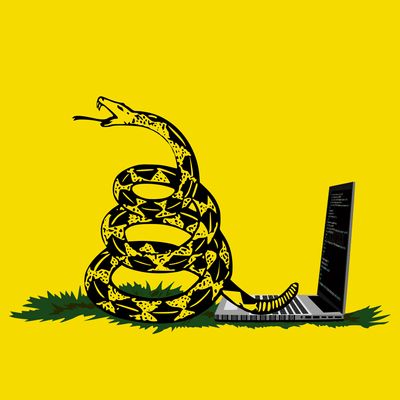
Over the last few months, a number of tech elites have suggested that Silicon Valley is a very liberal place. Testifying before Congress earlier this year, Mark Zuckerberg called the tech industry “a very left-leaning place.” Similarly, Jack Dorsey told CNN, “We need to constantly show that we are not adding our own bias, which I fully admit is more left-leaning.”
The idea that Silicon Valley is a liberal utopia might confirm the suspicions of conservatives who believe (baselessly) that they’re being suppressed on social-media platforms, but a new academic study provides strong evidence that the politics of Silicon Valley elites are less “liberal” than “elite.”
“Predispositions and the Political Behavior of American Economic Elites: Evidence From Technology Entrepreneurs,” a new paper by Stanford researchers David E. Broockman and Neil Malhotra and independent scholar Gregory Ferenstein, suggests that tech elites share many of the same political beliefs and presuppositions among themselves — but that those beliefs don’t fall neatly into “liberal” or “conservative” categories as considered by most people. The paper, released in the American Journal of Political Science, suggests that while tech elites by and large associate themselves with Democrats on cultural and social issues, when it comes to government regulations, they are more conservative than the average Republican donor. What’s more, researchers found tech elites hated the thought of regulation more even than non-tech millionaires.
Broockman and his fellow researchers surveyed nearly 700 wealthy tech leaders in what amounts to the most extensive academic survey of this group to date. The researchers used Crunchbase, an open database run by TechCrunch, to find influential tech players — most of whom were themselves millionaires — and individually emailed each and asked them to fill out a survey.
The survey asked the tech entrepreneurs questions about their general political policy preferences as well as their predispositions — the underlying and enduring beliefs that shape how these people see the world. On social and cultural issues, tech elites overwhelming aligned themselves with liberal positions: Ninety-six percent surveyed supported gay marriage, 82 percent favored increased gun control, and 67 percent opposed the death penalty. When asked about government regulation and unions, however, the tech elites could not be further from the left. The research found nearly all tech entrepreneurs surveyed think that “It is too difficult to fire workers,” while 74 percent of them said they support weakening labor unions.
Research found that the tech elites responded with the same anti-regulatory zeal when questioned about other industries as well, as in a question about whether florists should be able to raise prices on flowers during holiday seasons. “It’s not just when you say, ‘should tech be regulated,’ that they don’t like regulation,” Broockman, the paper’s lead author, said in a phone call with Intelligencer. “I don’t think the average technology entrepreneur sees themselves in the same category as a florist, but they still side with them.” On the other hand, the entrepreneurs overwhelmingly favored increased taxes on the rich — that is, themselves — and further redistribution of wealth to poor communities.
According to Broockman, the Silicon Valley titans may be their own political entity, wielding certain political predispositions that don’t easily map onto U.S. party politics. To support this point, the researchers ran a second experiment, this time on Stanford students. College-age tech students poised to enter the Silicon Valley ranks overwhelmingly responded like their millionaire idols: liberal on social issues, staunchly conservative on regulation.
“Long before these people get involved in the tech industry and found their own companies, they already have these predispositions that are leading them to be more skeptical of regulation, yet are liberal otherwise,” Broockman said. In other words, the findings suggest those who eventually work in tech may share some common values and experiences with each other that lead them into the profession.
This is not necessarily a new idea: The classic essay 1995 essay “The Californian Ideology” laid out the libertarian foundations of the tech industry, and Steven Johnson coined a term in Wired article this summer for the “liberal-not-liberal” tech-elite attitude, “Liberaltarianism.” Now we have some empirical evidence that this loose political affiliation extends to more than just the loudest and most prominent voices in tech. Broockman compared the political power of emerging tech elites to that of 19th-century railroad barons. “It’s no secret that the tech industry is immensely growing on all dimensions that would give them political power,” he said. “When you think about everything a politician is looking to in terms of where they are getting their voters, where they are getting their campaign donations, technology companies and those who found them and run them are in a position to exert a lot of power in politics.”
For Broockman, the challenge this poses isn’t to the Republicans complaining about supposed liberal bias, but the Democrats who are forced to choose between different belief systems. “I think what the stage is set for is Democratic officeholders will really be pushed within the party and really be torn between interests from unions and more classic consitutientices on the one hand and what these technology entrepreneurs want them to do on the other.”





























